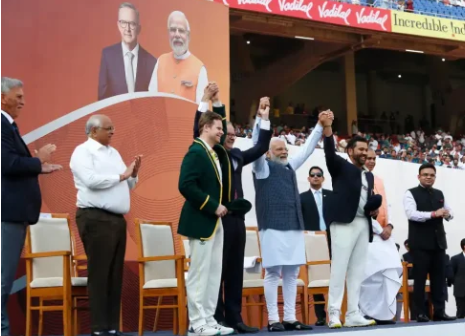
In the midst of India’s heated general elections and intense summer temperatures, Prime Minister Narendra Modi utilized the country’s passion for cricket to inflame religious tensions for political benefit. During a rally in Dhar, Madhya Pradesh, Modi propagated the notion that the Indian National Congress would select the national cricket team based on religion, catering to rampant Islamophobia prevalent amongst his voter base.
Parallel to this, the termination of the electoral bond funding system by the Indian Supreme Court lifted the veil on questionable financial contributions made to political parties. One example included Chennai Super Kings Cricket Ltd., contributing Rs 5 crore ($600,000 USD) to the All India Dravida Munnetra Kazhagam—part of the BJP-led National Democratic Alliance for the 2019 general election.
Recently, Indian cricket has experienced renewed involvement in political affairs, exhibiting three prominent patterns:
Appointment of relatives and associates in influential positions throughout the BCCI and state entities, like BCCI Secretary Jay Shah, son of Union Home Minister and PM Modi confidante Amit Shah.
Promotion of cricket as a platform for nationalistic disputes via jingoistic discourse, connecting Indian squad successes to narratives of ‘New India’.
Revision of cricket heritage through stadium name changes and shifting the center of gravity towards Gujarat, homeland of PM Modi.
These tendencies demonstrate the extent of India’s influence in international cricket, with Jay Shah serving as both BCCI Secretary and the head of the Asian Cricket Council. Moreover, prominent members of the Modi Government, such as Anurag Thakur and his brother Arun Dhumal, held top posts in the BCCI and IPL respectively.
Political affiliates find refuge in T20 franchise cricket leagues operating in India. Billionaire partner of the BJP, Mukesh Ambani’s Reliance Group, possesses ownership of the Mumbai Indians, whereas the Adani Conglomerate recently acquired the Gujarat Giants in the Women’s Premier League.
An investigative piece published in the 2024 Wisden Almanack reported the BCCI’s unsuccessful endeavor to compel a color change in India’s jersey for their confrontation versus Pakistan in Ahmedabad during the previous year’s 50-over World Cup. Initially proposed to replace traditional blue attire with orange, symbolizing Hindutva, the movement received considerable attention. Although unrealized, the incident showcases the impact of Hindu nationalism upon contemporary cricket culture in India.
Redefining the Cricketing Landscape: India’s Westward Power Expansion and Domestic Venue Name Changes
With the ascendancy of the Gujarat faction in Indian politics, cricket has assumed greater significance in regional power dynamics. Under the BJP’s reign, Gujarat has observed unprecedented prosperity in cricket, hosting the Narendra Modi Stadium—boasting the highest spectator capacity globally. Noteworthy occasions held at this venue comprise the inauguration and conclusion of the 2023 ODI World Cup, as well as high-profile matches featuring international competitors.
Concurrently, the practice of assigning namesakes to cricket arenas posthumously has diminished, replaced instead by honoring living BJP officials. Examples of this transition materialized through the christening of the Narendra Modi Stadium in Ahmedabad and the Arun Jaitley Stadium in Delhi, formerly known as Feroz Shah Kotla Ground before its dedication to the late Finance Minister.
This development reflects a broader pattern pursued by the Modi regime concerning roadway and landmark title modifications bearing Islamic references. Regardless of forthcoming election outcomes on June 4th, Indian cricket faces lingering consequences resulting from Hindu nationalist governance.